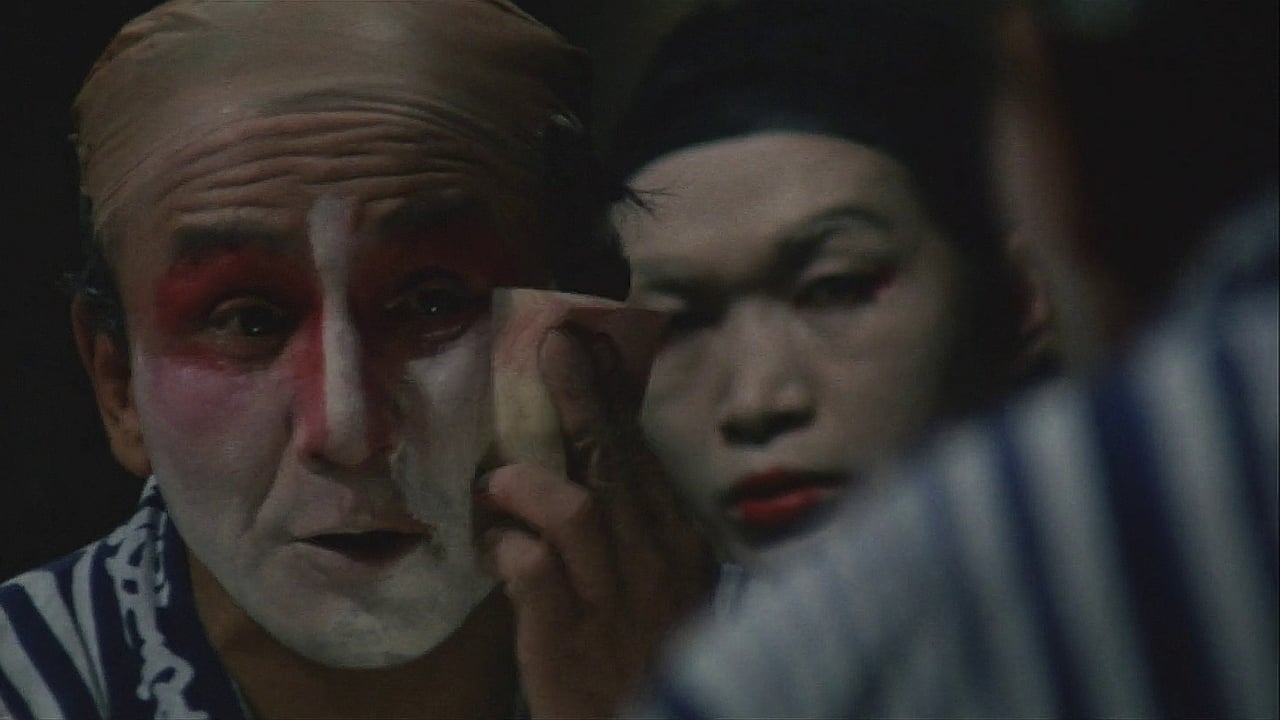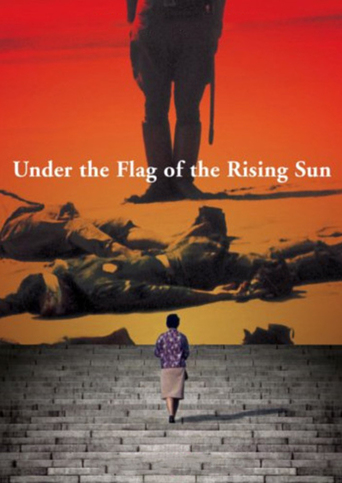



To me, this movie is perfection.
If the ambition is to provide two hours of instantly forgettable, popcorn-munching escapism, it succeeds.
View MoreWhile it is a pity that the story wasn't told with more visual finesse, this is trivial compared to our real-world problems. It takes a good movie to put that into perspective.
View MoreIt's a good bad... and worth a popcorn matinée. While it's easy to lament what could have been...
View MoreThis is about a woman's quest to find out the truth about her husband Togashi's WWII execution over twenty years after the fact. After spending those twenty years attempting to get answers from bureaucrats, she finally finds some who have some empathy and give her a list of names of people that served with him. She travels to see these people and we see what kind of lives the soldiers returned to. First there's her encounter with a man who lives in what appears to be a mountain of garbage. He tells her that her husband was a great man, a hero who he owes his life to. This man tells her that Togashi wasn't executed at all, that he had to have died in battle. He is unwilling to tell the authorities this story, explaining that he doesn't like to be around people and he hasn't been to a city in years.Naturally she isn't satisfied, part of the reason she wants to find out about her husband's death is to have his name cleared so he'll get the same recognition as other people who died in the war. The next man, a comedic actor who stars in farces about the war, tells her Togashi was executed for stealing a potato from a farmer. The film continues on this way as Togashi's wife gets a different story from every man she encounters. Her journey leads her to people of various social standings including a blind man with an adulterous waitress for a wife, a leftist professor, and a retired public official. Each encounter brings her nearer the truth and gives her a greater understanding of the war experience. She begins to see how terrible it was for all involved and she begins to realize that nobody ever really recovers from it; in other words, a government's recognition of the death of a person it forced to go to war and essentially killed is completely worthless, especially when the government literally executes that person.Fukasaku's film is well plotted and it has a precisely executed theme. Further, the visuals are often impressively delivered. The editing is top notch, particularly in the scenes that suggest the main character's interior state. There's also some impressively handled "new wave" experimental techniques such as still frames and color filters. This film's style called to mind the work of more well known Japanese film-makers of the era such as Nagisa Oshima and Shohei Imamura while still remaining an original, personal work for Fukasaku.
View More"Under the Flag of the Rising Sun" or "Gunki hatameku motoni" is a film by Kinji Fukasaku, a Japanese director renown for his work in the crime and 'chambara' film genres. This film was made by the director amid a streak of Yakuza-oriented films and shares some of the same filming style characteristic of his other films, detailed and somber character portraits, sudden outbursts of intentionally ugly and clumsy violence, intimate romantic relationships which end tragically or abruptly, and protagonists who have trouble compromising their own moral integrity to fit in with changing social hierarchies.The main protagonist of this film is a Japanese war widow attempting to find out the actual events behind her husband's disappearance from his military station in New Guinea. After the war, Sakie Togashi never received a pension for her husband's military service because Sergeant Togashi was apparently court-martialed, but no official details are disclosed to her by social services or government offices for twenty years after his disappearance. Feeling sorry for her, several social workers give her the names of four men from her husband's platoon who returned to Japan after the war.The film mixes the present-day (1970s) settings and quest of Sakie Togashi with various flashbacks involving her husband and the company members on New Guinea. This is interspersed with old war footage and photographs from the Pacific Theater. The more chaotic or violent scenes are often filmed in the manner of many action films from the early 1970s, with chopped, slow-motion effects and caustic drawn-out sounds.Under the Flag of the Rising Sun is reminiscent of other important films (Rashomon, Jacob's Ladder, The Deer Hunter, The Human Condition) about the aftereffects of 20th century war on the human psyche, family and social networks, and the common people who end up fighting for their country. There are some good quotes from some of the retired soldiers, such as "people from the bottom of the heap never rest in peace," implying that individuals who occupy the less influential rungs of society are constantly manipulated by those in positions of power. It is a unique film for a Japanese filmmaker, in a country rarely known to recant its actions during World War II.
View MoreThere are three great war movies. This film is at the top of the list. You will not be able to get these images out of your thoughts. I would not categorize this film as anti-war; rather, I'd say it takes a realistic look at the battle/conflict it portrays and does not flinch at failing to romanticize any part of the story. You might see the narrator's story somewhat romantic, but the loss suffered here justifies the actions of the character. All in all a brilliant story of war like you have never seen it before. The story also examines bureaucratic Japan after the war that's where the story really packs a punch.There is beautiful scene involving a last meal that puts this writer/screen writer and this director at the top of my list. Great movie.By the way, the other two great war movies are, "Battle of Algiers" and "Queimada."
View MoreWhat's the truth,and what does it bring us ? That's the question what carries this movie up to a level of masterpiece. I will not say that this IS a masterpiece since it also has it flaws, but to come to the plot of this movie, it is about a war widow (Sachiko Hidari) which seeks out the ministry of welfare, in order to clear her late husbands name (who was a sergeant in the war)from the name of "desertor". For almost 20 years she is trying to get some answer on her late husbands strange death, and in 1971, when the head of the department of ministry of Welfare changes, she tries it again. (like every year) The man, just like his predecessors, can't clear her husbands name, however feeling sorry for her, gives her a list of 4 names who didn't respond on the inquiry of her husbands death, so she can seek out the truth herself.This is where the problem starts, for all 4 men ( 1 first class private, a corporal, a military police officer, and a 2nd grade lieutenant) tell her 4 different story's about her late husbands death. The only questions is who is right, and who lies, and as last who simply doesn't know. All the men state at first (which is remarkable) that they simply don't recall much from that time, and apart from from that the military records are not complete, so the widow will never have any prove of the story on how her husband died. This is an interesting factor which shows that even in this movie, Japan still can not deal with it's history.Back to the movie itself and the review. Sachiko Hidari who plays the widow does a good job on the leading lady here, for her desperation doesn't seem unreal, however sometimes a little overacted. In my opinion it is Tetsuro Tamba who plays the role of one of the returned soldiers from the war who deserves the most credit. He plays the first soldier (private first class) who lives in a dump, between tramps an beggars, and his image of this soldiers who cannibalized on his fellow soldiers is so haunting that it doesn't leave the mind. After his deed of feeding on their flesh because of starvation, he returns in the slums of Tokyo feeling secure, among the chaos. But when Japan cleans up he feels left behind, he feels still dirty (and guilty) and decides to live among the slums in a back alley ghetto dump (very ironic as a PIG farmer). Of the four war witnesses, he is the strongest representation of the carnage pf chaos of it, but that doesn't mean the other 3 are just loose sand. The power of this picture lies in the story's of these 4 men who will tell you about the horrors of that war.Fukasaku Kinji (Battle Royal, the Geisha House, Fall Guy) has made a very interesting documentary of war, crafted in the form of a motion picture. The film is in color but the flashbacks upon what happened to Sachiko Hidari husband are all in monochrome black and white (except for the strongest shots which switch over into color. Together with some freezing time frames, and b/w picture of the war and holocaust, this picture is trying to make clear that war IS nothing but chaos. Fukasaku's direction is good, however, as said, he is victimizing the wrong group in my eyes. I is understandable as Japanese that he does this, but it doesn't make it right. I don't want to me a moralist, but this is something that Japans just keeps denying (and it affects me for my roots are German, and we confessed to all of the war crimes, but through the incident with the atomic bomb, Japan got away with the victim label) Back to the theme, the pictures of holocaust don't shock anymore, as much as they might have in 1972. (for all those who have seen the war pictures and tapes of Europe from the second world war), but still they leave behind a strong impression on how brutal, and more important how REAL this was. This isn't fiction, it is very much real, and there is still a rather unbelief to what humans are capable of. This films doesn't deny anything from it's image that is inhuman. it shows you the torture (although only of Japanese people, there is only 1 foreigner that get's killed here openly before the camera) of soldiers, the cannibalism, the vermin, the blood lust of officers, the madness, and the chaotic structure. What is left behind are the feeling of fear, you can see it in all the 4 men who are left behind to tell the tale of it.This movie is not an action flick in the sense of "saving private Ryan" or "Pearl Harbour". This is a slow (or more slower) movie that has it's power in the story it has to say. The camera actions (the image)of the picture is not that new or uncommon, but it hits the nerve of the open wound. To be more precise the story fits the image that Fukasaku shows you.What also was a relieve that this picture didn't care much for heroism that Hollywood filmmakers give their pieces a lot of times, no it's shows us how low people can get if it comes to survive. For anyone who goes beyond Hollywood cinema joy, and a nice night at the movies, an interesting piece to watch, and if it was only to hear the story from A. the Japanese side, and B. the hear a second world war tale which isn't about Nazis Europe, Americans or Germans.
View More